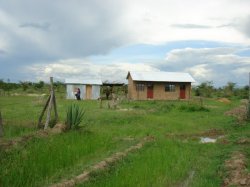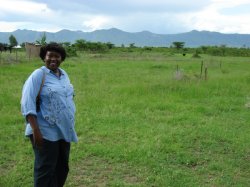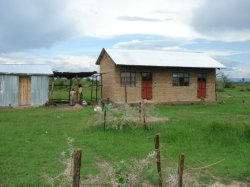
The "Grandparents with Orphans" project at Chiga

Betty Mutere - the founder of the project

It may look small (and this is just the start),
but its aims are big, and it is already effective!
|
|
The "Grandparents with Orphans" project at Chiga is based on the recommendations
from a Masters in Community Health & development Research study thesis.
(2003) by Betty Mutere.
Vision:
-
To see grandparent-headed households and homesteads leading dignified and
self-sustaining lives.
Project Objectives:
-
To enhance the food security
-
To enhance access to educational opportunities
-
To enhance access to health
-
To enhance economic adaptation
Project Activities:
-
The activities are carried out to fulfil each of the main objectives. They
are grouped under four major programmes called the FEHED programmes.
The FEHED Programmes
FEHED is an acronym for Food Security, Education, Health and Enterprise
Development.
Below are the essential elements under each of the four main programmes.
The target intervention point is households/homesteads headed by Third-generation
Caregivers.
Food Security Programme
-
Dry feeding (especially for large households as emergency/supplementary measure)
-
Briquette (alternative fuel) making
-
Kitchen garden (vegetable patch) promotion
-
Enhanced local poultry production at household level
-
Medicinal, nutritious herb growing (especially for the HIV infected)
-
Fruit tree/agro forestry promotion at household level
Educational Support Programme
-
Early Childhood development (ECD) orphan centres
-
Primary education supplements support activities
-
Orphaned youth vocational & community development training activities
-
International student attachments / student exchange activities
-
Action research on third-generation caregiver issues
Health Programme
The activities under this programme are divided into preventative and curative
as below:
-
Preventative
-
Insecticide treated nets promotion and provision for malaria prevention
-
Provision of locally made beds, mattresses and blankets (especially for young
orphans)
-
Enhanced access to water through provision of chlorine treatment, bicycle
transportation, drain pipe for rain harvesting, 20 litre jeri cans and 100
litre plastic storage drums
-
Enhanced sanitary practices; latrine hole cover promotion and 'leaky tin'
use, promotion (both inside and outside the latrine)
-
Health education, specifically in the areas of:
-
Integrated (home) management of childhood illness and timely referral
-
Prescription drugs (ab)use
-
PHAST (Hygiene sanitation)
-
Anti-retroviral therapy, opportunistic infectious prevention and detection,
safe home-based care giving practices for AIDS patients
-
Psychological support
-
Counseling - separately for young children, infected widows (post test clubs),
youth and aged caregivers
-
Sports, music and drama activities and excursions for youth orphans
-
Curative
-
Provision of 'bicycle ambulance' to ferry the aged to health centre/hospital
-
Enhanced access to essential drugs (especially those required by the geriatric
population) through community based pharmacy
-
Annual medical check ups. (Future plans to set up rural medical examination
centre with diagnostic x-ray facility, pap smear and breast examinations
for screening of cancers)
-
Weekly home visits by Community Nurse and Clinical Officer for:
-
Follow up on ART/Home based care support
-
Diagnosis and treatment
Enterprise Development
-
Commercial farming (especially for young widows and youth with land)
-
Community based tourism promotion
-
Wholesale and retail of grains, fish and vegetables enhancement
-
Improved marketing of products/services of group
-
Educational books, tapes and CDs
CHIGA PROJECT MAIN PAGE
|
![]()